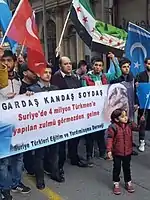Syrians in Turkey
Syrians in Turkey includes Turkish citizens of Syrian origin, Syrian refugees, and other Syrian citizens resident in Turkey. Istanbul, the most populous city in Turkey, hosts the highest number of Syrians (approximately 495,000 registered people).[2]
| Total population | |
|---|---|
| 3,589,289 registered (March 2020) [1] | |
| Regions with significant populations | |
| Mainly Istanbul with communities in Gaziantep, Hatay, Şanlıurfa, Adana and Mersin. | |
| Languages | |
| Syrian Arabic, Turkish, Kurdish, | |
| Religion | |
| Predominantly Islam (mostly Sunni Muslims and a minority of Shi'a Muslims and Alawites), a significant of Christian minorities (mainly Syriac Christianity and Eastern Catholic) as well as a small number of Sabean-Mandaeans. | |
| Related ethnic groups | |
| Arabs, Armenians, Assyrians, Azeris, Iranians, Kurds, Mizrahim, Turkmen |
History
Syrians in Turkey include migrants from Syria to Turkey, as well as their descendants. The number of Syrians in Turkey is estimated at over 3.6 million people as of March 2020,[3] and consists mainly of refugees of the Syrian Civil War.
In 2017, Syrian citizens accounted for 24% of all work permits granted to foreign nationals, making Syrians the largest single group of foreign nationals with work permits.[4]
Following the Turkish military intervention in the Afrin District in Northern Syria against the Kurdish YPG militia, some Turkish politicians have suggested that Syrian refugees in Turkey should be repatriated to Syria.[5]
According to news releases in 2019; there is 405,521 Syrians born in Turkey since 2011, 79,820 Syrians who got Turkish citizenship, approximately 329,000 Syrians who returned to Syria, 31,185 Syrians who has working permit, and 15,159 companies which has at least one Syrian company member.[6]
Ethnic groups

Syrians living in Turkey are formed of various ethnic and religious groups. The majority are Arabs (including Palestinians), Syrian Turkmen and Syrian Kurds.[7]
Arabs
Assyrians
Some Assyrians who have fled from ISIL have found temporary homes in the city of Midyat. A refugee center is located near Midyat, but due to there being a small Assyrian community in Midyat, many of the Assyrian refugees at the camp went to Midyat hoping for better conditions than what the refugee camp had. To their supine, many refugees were in fact given help and accommodations by the local Assyrian community there, perhaps wishing that the refugees stay, as the community in Midyat is in need of more members.[8]
Turkmen
By December 2016 the Turkish Foreign Ministry Undersecretary Ümit Yalçın stated that Turkey opened its borders to 500,000 Syrian Turkmen.[9]
In 2020 the Voice of America reported that 1,000,000 Syrian Turkmen (including descendants) who are living in Turkey are requesting to become Turkish citizens.[10]
Kurds
See also
References
- "Geçici Koruma". Göç İdaresi Genel Müdürlüğü. March 10, 2020. Retrieved March 10, 2020.
- "Istanbul home to largest number of Syrians in Turkey". Retrieved 2018-06-06.
- "Situation Syria Regional Refugee Response". data2.unhcr.org. Retrieved 2018-05-13.
- "Turkey handed work permits to more than 87,000 foreigners in 2017". Hürriyet Daily News. Retrieved 2018-05-13.
- "Syrian refugees in Turkey face calls to return as public mood changes". IRIN. 2018-03-27. Retrieved 2018-05-13.
- Doğanışık, İrem. "Türkiye'de Suriyeli Sığınmacılar". www.dogrulukpayi.com (in Turkish). Retrieved 2021-01-18.
- Wahby, Sarah; Ahmadzadeh, Hashem; Çorabatır, Metin; Hashem, Leen; Al Husseini, Jalal (2014), Ensuring quality education for you refugees from Syria (12-25 year): a mapping exercise, Refugee Studies Centre, University of Oxford
- "Middle Eastern Christians Flee Violence for Ancient Homeland". National Geographic. 29 December 2014. Retrieved 19 August 2017.
- Ünal, Ali (2016). "Turkey stands united with Turkmens, says Foreign Ministry Undersecretary Yalçın". Daily Sabah. Retrieved 11 September 2018.
Yalçın explained how Turkey opened its borders to 100,000 Turkmens from Iraq and 500,000 from Syria, sharing their pain and trying to mend their wounds as much as they could with economic, social and humanitarian aid.
- Erkılıç, Orhan (2020). "Türkiye'deki Suriyeli Türkmenler de Vatandaşlık İstiyor". Voice of America. Retrieved 17 December 2020.
1 Milyon Suriyeli Türkmen Vatandaşlık Hakkından Yararlanmak İstiyor.
